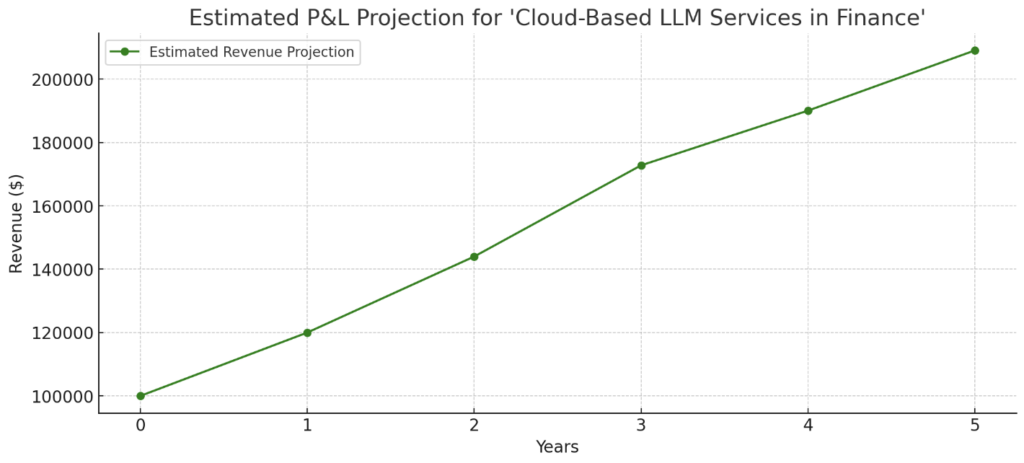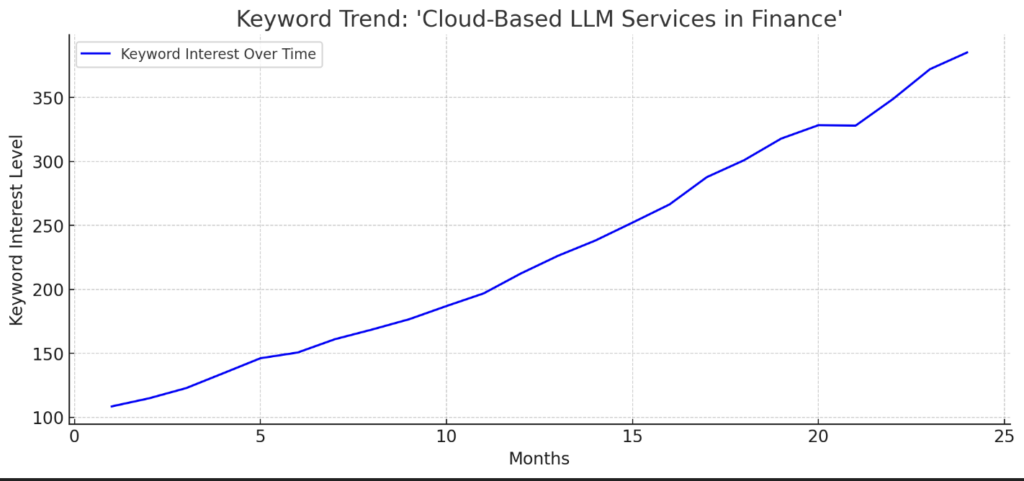Cloud-Based LLM Services in Finance Ultimate Guide 2024
Cloud-based Large Language Model (LLM) services are revolutionizing the finance industry by offering powerful AI-driven solutions that enhance decision-making, automate processes, and improve customer experiences. These advanced language models, hosted on cloud platforms, provide financial institutions with access to cutting-edge natural language processing capabilities without the need for extensive in-house infrastructure or expertise. By leveraging cloud-based LLM Services in Finance, banks, investment firms, and insurance companies can analyze vast amounts of unstructured data, generate insights, and streamline operations across various domains, including risk assessment, fraud detection, and personalized financial advice.
The integration of these AI-powered tools into existing financial systems enables organizations to stay competitive in an increasingly digital landscape while maintaining compliance with regulatory requirements and ensuring data security.
Accurate and current information is crucial for discussing cloud-based LLM services in finance. Recent research predicts that the global AI fintech market will reach $26.67 billion by 2026, with a CAGR of 23.17% from 2021, fueled by the adoption of cloud-based LLM services and AI technologies. A 2023 Deloitte survey found that 70% of financial institutions are using or planning to implement cloud-based AI solutions within two years. Additionally, Gartner forecasts that by 2025, 75% of enterprises will move from pilot programs to operationalizing AI, leading to a fivefold increase in data streaming and analytics infrastructure. These insights highlight the essential role of cloud-based LLM services in shaping the future of finance and the importance of staying informed about their advancements.
Cloud-Based LLM Services in Finance
Body: Challenges, Advantages, and Disadvantages
Challenges
Cloud-based LLM services in finance face several significant challenges:
- Data Privacy and Security In LLM Services in Finance: Financial institutions handle sensitive customer information, making data protection paramount. Ensuring the security of this data when using cloud-based LLM services is a major concern.
- Regulatory Compliance In LLM Services in Finance: The finance sector is heavily regulated, and cloud-based AI solutions must adhere to various regulations such as GDPR, CCPA, and industry-specific rules.
- Model Bias and Fairness In LLM Services in Finance: LLMs can inadvertently perpetuate biases present in training data, potentially leading to unfair or discriminatory outcomes in financial decisions.
- Interpretability and Explainability In LLM Services in Finance: The “black box” nature of complex LLMs can make it difficult to explain their decision-making processes, which is crucial in financial contexts.
- Integration with Legacy Systems In LLM Services in Finance: Many financial institutions rely on older, established systems that may not easily integrate with modern cloud-based LLM services.

Advantages Of LLM Services in Finance
Despite these challenges, cloud-based LLM services offer numerous advantages:
- Enhanced Decision-Making: LLMs can analyze vast amounts of data to provide insights and support more informed financial decisions.
- Improved Customer Experience: Personalized financial advice and 24/7 customer service through AI-powered chatbots enhance customer satisfaction.
- Cost Efficiency: Cloud-based solutions reduce the need for extensive in-house infrastructure and maintenance.
- Scalability: Cloud services can easily scale to meet changing demands and processing needs.
- Rapid Innovation: Regular updates to cloud-based LLMs ensure financial institutions always have access to the latest AI capabilities.

Disadvantages
Some potential drawbacks include:
- Dependency on Third-Party Providers: Reliance on external cloud services can create vulnerabilities if the provider faces downtime or security breaches.
- Potential for Overreliance: There’s a risk of over-depending on AI recommendations without sufficient human oversight.
- Initial Implementation Costs: While cost-effective in the long run, the initial setup and integration of cloud-based LLM services can be expensive.
- Data Transfer Bottlenecks: Large-scale data processing may be limited by network bandwidth and latency issues.
Navigating the Challenges
To address these challenges effectively:
- Implement robust encryption and access control measures to protect sensitive data.
- Stay informed about regulatory changes and work closely with compliance teams to ensure adherence.
- Regularly audit and de-bias LLM models to promote fairness in financial decision-making.
- Develop explainable AI techniques to increase transparency in model decisions.
- Invest in modernizing legacy systems and creating APIs for seamless integration with cloud services.
Safety Considerations
Ensuring the safety of cloud-based LLM services in finance is crucial:
- Data Anonymization In LLM Services in Finance: Use techniques like tokenization to protect personal identifiable information.
- Multi-Factor Authentication In LLM Services in Finance: Implement strong authentication methods for accessing cloud-based LLM services.
- Regular Security Audits In LLM Services in Finance: Conduct thorough and frequent security assessments of the cloud infrastructure and LLM models.
- Disaster Recovery Plans In LLM Services in Finance: Develop comprehensive plans to handle potential data breaches or service disruptions.
- Employee Training In LLM Services in Finance: Educate staff on best practices for using cloud-based LLM services securely.
By addressing these challenges and prioritizing safety, financial institutions can harness the power of cloud-based LLM services while minimizing risks and ensuring regulatory compliance. As the technology continues to evolve, staying informed and adaptable will be key to leveraging its full potential in the finance sector.
ConclusioN On LLM Services in Finance
Cloud-based LLM services are transforming the finance industry, offering unprecedented opportunities for innovation, efficiency, and customer service enhancement. While challenges such as data security, regulatory compliance, and model bias exist, the advantages of these AI-powered solutions far outweigh the drawbacks when implemented thoughtfully and responsibly.
Financial institutions that successfully navigate the complexities of cloud-based LLM integration stand to gain a significant competitive edge in an increasingly digital marketplace. By leveraging these advanced AI capabilities, organizations can unlock new insights from vast datasets, automate time-consuming processes, and deliver personalized experiences that meet the evolving expectations of modern consumers.
As the technology continues to mature, we can expect to see even more sophisticated applications of cloud-based LLMs in finance, from advanced risk modeling to real-time fraud detection and beyond. The key to success lies in striking the right balance between innovation and caution, ensuring that AI adoption aligns with regulatory requirements and ethical standards.
Advice for Newcomers
For those looking to enter the field of cloud-based LLM services in finance:
- Develop a strong foundation in both finance and technology, particularly in areas like machine learning, natural language processing, and cloud computing.
- Stay informed about the latest developments in AI and their applications in finance through continuous learning and professional development.
- Familiarize yourself with relevant financial regulations and data protection laws to understand the compliance landscape.
- Gain practical experience through internships or projects that involve working with cloud-based AI solutions in financial contexts.
- Network with professionals in both the finance and AI sectors to gain insights and potential career opportunities.
- Be prepared to address ethical considerations and biases in AI models, as this will be crucial for responsible implementation in finance.
- Develop skills in data analysis and interpretation, as these will be essential for deriving meaningful insights from LLM outputs.
By following these steps and maintaining a commitment to ethical and responsible AI use, newcomers can position themselves for success in this exciting and rapidly evolving field.
Further Reading
For more information on cloud-based LLM services in finance, check out these resources:
- IBM Cloud – AI in Financial Services
- Google Cloud – AI Solutions for Financial Services
- AWS – Machine Learning in Financial Services
- Microsoft Azure – AI in Financial Services
- Deloitte Insights – AI in Financial Services
These links provide valuable insights into the current state and future potential of cloud-based LLM services in the finance industry.







